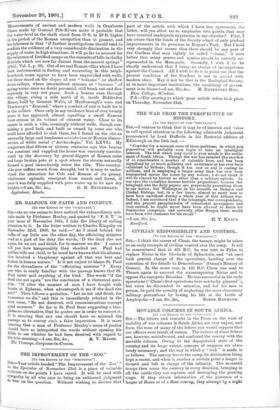CIVILIAN RESPONSIBILITY AND CONTROL. [To THE EDITOR OF THE "SPECTATOR. "]
Sra,—I think the career of Cleon, the tanner, might be taken as an early example of civilian control over the army. It will be remembered that in 425 B.C. he was sent to Pyles to replace Nicias in the blockade of Sphacteria, and "at once took general charge of the operations, handing over the execution of the details to Demosthenes" (Oman's History of Greece). In the same way, in 422 B.C. Cleon was sent to Thrace, again to succeed the unenterprising Nicias and to oppose the energetic Brasidas. He was successful in his early operations (" Cleon's first operations were not badly planned "), but when he descended to minuti te, and led his men in person, he paid the penalty of neglecting the most elementary military precautions by lo sing his life at the battle of














































 Previous page
Previous page